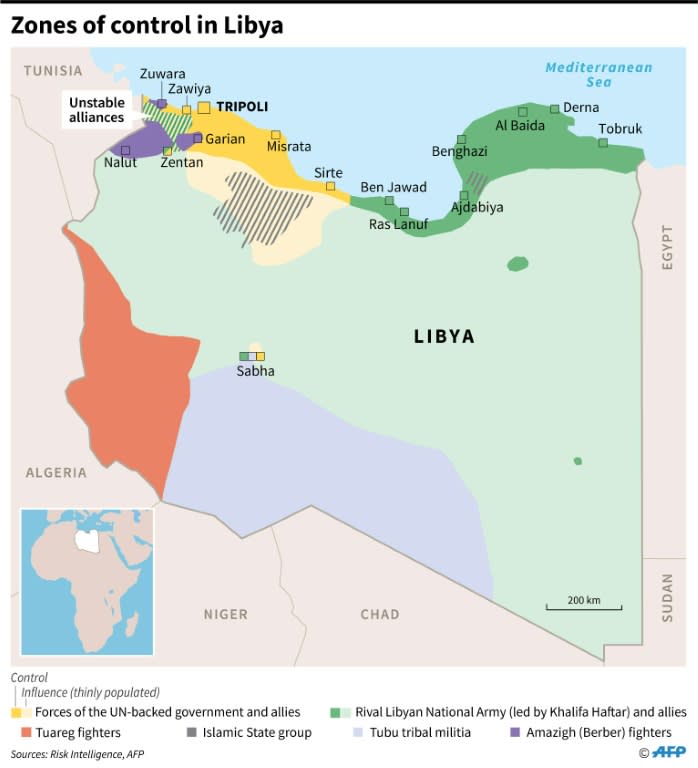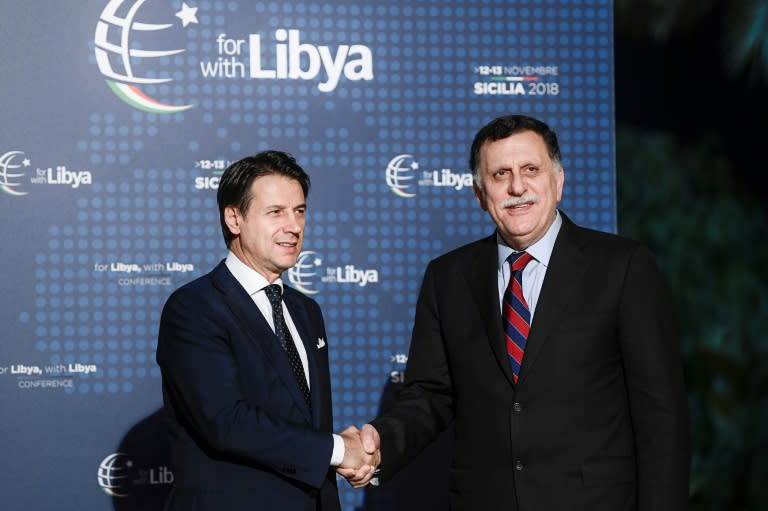Italy crisis talks end after laying bare Libya divisions
Italy and the United Nations on Tuesday praised an international conference on the Libya crisis as a success, despite the stark divisions that emerged among key players in the chaos-stricken nation. Italy's Prime Minister Giuseppe Conte and the UN envoy said all parties had agreed to a UN conference planned for early 2019 to prepare for elections to end the crisis. The Italian initiative was the latest international effort to stabilise the North Africa state which has struggled with fighting amoung rival factions since the fall of Moamer Kadhafi in a 2011 civil war. Two days of talks and suspense saw eastern Libyan strongman Khalifa Haftar finally turn up at the Palermo meeting but snub the actual conference, preferring instead to hold a series of meetings on the sidelines. When Turkey was not invited to one of those meetings, its Vice President Fuat Oktay walked out of the actual conference, voicing "deep disappointment". Nevertheless, Conte told journalists after the conference that "a strong cohesion of the international community has come out of this." "The support of the international community can accelerate the stabilisation process that must be totally left up to the Libyans," Conte said. - 'More conviviality' - UN Libya envoy Ghassan Salame praised a "much higher level of conviviality among Libyan stakeholders so I do consider this conference a success." Italy is the latest country aiming to bring Libya's disparate and often warring factions together after a Paris summit in May saw the Tripoli-based Government of National Accord (GNA) and Haftar agree to hold national polls on December 10 -- a date which has fallen by the wayside. Now the UN is targeting a national conference in early 2019 that would be organised to provide "a platform" for Libyans to spell out their vision for the future. Elections are slated for a few months later, with no precise date yet decided. "I saw unanimous support in the international community for it (the national conference) but also I got commitment from those Libyans here that they will attend it... so I feel more reassured," Salame said. "I think now we have a reasonable chance of success and that's why we're moving." Salame said that Haftar was committed to next year's conference, playing down his dramatic arrival and departure. "All international conferences have various formats, sometimes smaller, sometimes larger. In some circumstances people are prepared to meet with enthusiasm, in some they are not prepared to," Salame said. Turkey walked out after Haftar joined a meeting on the conference's sidelines with his UN-backed rival Prime Minister Fayez al-Sarraj and other leaders, but not with Turkish representatives. The Haftar camp regularly accuses Turkey and Qatar of militarily and financially backing his rivals, including Islamists. "Any meeting which excludes Turkey would prove to be counter-productive for the solution of this problem," Vice President Oktay said in a statement. Egypt's President Abdel Fattah al-Sisi, Russian Prime Minister Dmitry Medvedev, UN envoy Ghassan Salame, European Council President Donald Tusk and French Foreign Minister Jean-Yves Le Drian also attended the Sarraj-Haftar meeting, hosted by Conte ahead of roundtable talks, which were to have included Turkey. Haftar left Sicily immediately after the meeting. - 'A fundamental step' - Haftar, whose forces control all of northeastern Libya, refuses to sit down at the same table as the Islamist leaders he fiercely opposes. Just as in May, the key Libyan invitees were Haftar, the eastern parliament's speaker Aguila Salah, GNA head Sarraj and Khaled al-Mechri, speaker of a Tripoli-based upper chamber. For Rome's populist government, a top priority is stemming the flow of migrants who exploit Libya's security vacuum in their quest to reach European shores, often via Italy. In September, Italy's defence minister and parliamentary speaker both partly blamed France for Libya's security crisis, which continues to simmer seven years after the NATO-backed uprising toppled Kadhafi. The Italian criticism came as Tripoli was hit by militia clashes that killed at least 117 people and wounded more than 400 between late August and late September. Rome and Paris have for months been at loggerheads over Libya's election timetable. While France repeatedly endorsed the December date, Italy opposed it. But Salame told Egypt's Al-Ahram newspaper on Monday that any differences between Paris and Rome had now been "left behind".




